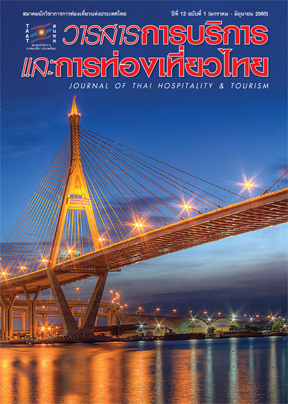Quality Management Affecting the Business Performance of Tourism in Chiang Rai Province
Main Article Content
Abstract
This research aimed to (1) To study a level of quality management, market orientation, and business performance of tourism in Chiang Rai province, (2) To study a degree of uncertainty in tourism environments in Chiang Rai province, and (3) To study the quality management and market orientation that affect the business performance of tourism in Chiang Rai province. The sample sizes were totally 500 samples, including the technical managers, middle managers, and top managers. The Structural Equation Modeling was theoretically used in this research. The findings showed that the majority respondents were female aged between 41-50 years old. They earned a bachelor’s degree or equivalent. Their average incomes were approximately 30,001-40,000 Thai baht. Their current positions were mostly associated with the middle managers. In general, an analysis of the quality management showed a high operation’s level with the highest average of the roles of the top managers together with the quality policy. The market orientation showed a high level as a whole with the highest average of the responsibility toward a customer. The levels of business performance were relatively high with the maximum average of the market/product development, and the quality outcomes. Moreover, the uncertainty of the marketplace environment was in the rather high level with the maximum average of the customers’ aspect. The additional results found that the government should help, assist, as well as support in terms of the marketing and information aspects. The empirical results derived from the SEM’s model revealed that the quality management had the positive effects to not only the market orientation, but also the business performance. Likewise, the market orientation had the positive effect to the business performance.
Article Details
References
[2] Chiang Rai Provincial Office of Tourism and Sport. (2014). Development Strategy. Retrieved from: https://www.chiangraiprovince.org/.
[3] Department of Tourism. (2016). Tourism Statistic. Retrieved from https://www.tourism.go.th/home.
[4] DeVellis, B. (1991). Scale Development. Newbury Park’ CA: SAGE Publications, Inc.
[5] Hemsworth, D., Sánchez-Rodríguez, C., & Bidgood, B. (2005). Determining the Impact of Quality Management Practices and Purchasing-related Information System on Purchasing Performance – A Structural Model. The Journal of Enterprise Information Management, 18(2), 169-194.
[6] Hunt, S. D. & Morgan, R. M. (1995). The Comparative Advantage Theory of Competition. Journal of Marketing, 59(April), 1-15.
[7] Kanthachai, Nongnout. (2015). Quality Management and Market Orientation Affecting the Organizational Performance of SMEs in Thailand. University of the Thai Chamber of Commerce Journal, 35(4), 42-53.
[8] Kanthachai, Nongnout. (2015). The Influence of SERVQUAL on Behavioral Intentions of Thai Tourists Travelling in the Thai-Myanmar Border Area. Contemporary Management Research, 11(3), 277-290.
[9] Kanthachai, Nongnout. & Taechamaneestit, Theera. (2015). Domestic Tourists’ Behavioral Intention in Using the Tourism Services: A Case Study of Chiang Rai Province’s Tourists. Prince of Songkla University, 32(2), 117-144.
[10] Kohli, A. K. & Jaworski, B. J. (1990). Marketing Orientation: The Construct, Research Propositions, and Material Implications. Journal of Marketing, 54(2), 1-18.
[11] Leekpai, Pradthana. (2013). Factors Affecting Organizational Innovativeness. Prince of Songkla University, 33(4), 55-63.
[12] Min, S. & Mentzer, J. T. (2000). The Role of Marketing in Supply Chain Management. International Journal of Physical Distribution & Logistics Management, 30(9), 765-787.
[13] Narver, J. C. & Slater, S. F. (1990). The Effect of A Market Orientation on Business Profitability. Journal of Marketing, 54(4), 20-35.
[14] Phemchat, N. (2005). Evaluating Performance. Ratchaburi : Muban Chombueng Rajabhat University.
[15] RaJu, P. S. & Lonial, S. C. (2001). The Impact of Quality Context and Market Orientation on Organizational Performance in A Service Environment. Journal of Service Research, 4(2), 140-154.
[16] RaJu, P. S., Lonial, S. C., Gupta, Y. P., & Ziegler, C. (2000). The Relationship between Market Orientation and Performance in the Hospital Industry: A Structural Equations Modeling Approach. Health Care Management Science, 3(3), 237-247.
[17] Rayakreaw, Nittima. & Fongsuwan, Wanno. (2012). The Relationships of Market Orientation, Logistics, Supply Chain Management and Effectiveness of Pharmaceutical Products in the Government Pharmaceutical Organization (GPO). Thammasat Business Journal, 35(136), 47-60.
[18] Saopayon, Siriphong. (2004). Human Resource Management. Bangkok : Book point.

